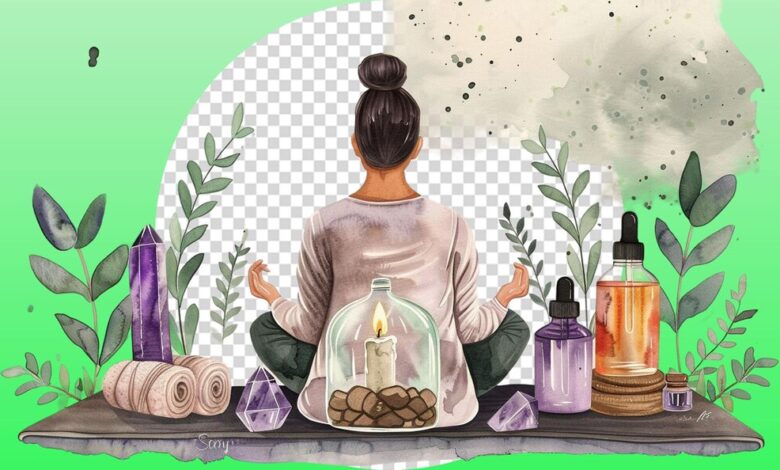Discover the Magic of Aromatherapy for Health and Wellness

Introduction to Aromatherapy
Imagine walking into a room filled with the soothing scent of lavender, or waking up to the invigorating aroma of eucalyptus. These experiences are not just pleasant—they are powerful. Aromatherapy, the practice of using essential oils for therapeutic benefits, has been cherished for centuries. From ancient Egyptian rituals to modern wellness practices, aromatherapy continues to captivate wellness enthusiasts and beginners alike.
In this ultimate guide, we will explore the multifaceted world of aromatherapy. We’ll uncover its historical roots, its significance in contemporary wellness, and practical tips for incorporating it into your daily routine. Whether you’re seeking stress relief, better sleep, or a boost to your immune system, aromatherapy has something to offer.
Health and Wellness Benefits
Aromatherapy is more than just a fragrant delight; it’s a holistic approach to well-being. Essential oils, derived from plants, carry potent properties that can enhance both physical and mental health.
For physical health, essential oils like eucalyptus and peppermint are renowned for their ability to clear respiratory pathways and relieve muscle tension. On the mental side, oils like lavender and chamomile are celebrated for their calming effects, making them perfect allies in the battle against stress and anxiety.
Scientific studies also support these claims. For instance, a study published in the Journal of Alternative and Complementary Medicine found that lavender oil significantly reduced anxiety levels in patients undergoing surgery. Another research conducted by Johns Hopkins University highlighted the antimicrobial properties of essential oils, proving their potential in boosting immune health.
Essential Oils 101
Top 10 Essential Oils for Beginners
Getting started with essential oils can be overwhelming given the sheer variety available. Here’s a curated list of the top 10 essential oils for beginners:
- Lavender: Calming and great for sleep.
- Peppermint: Energizing and excellent for headaches.
- Lemon: Uplifting and perfect for cleaning.
- Eucalyptus: Clears respiratory pathways.
- Tea Tree: Antimicrobial and good for skin issues.
- Chamomile: Relaxing and great for stress relief.
- Rosemary: Boosts focus and memory.
- Frankincense: Spiritual and good for meditation.
- Orange: Cheerful and mood-lifting.
- Ylang Ylang: Balances mood and hormones.
Their Uses and Safety Precautions
Each essential oil has unique properties and uses. For example, lavender can be used in a diffuser to promote relaxation, while tea tree oil is excellent for treating minor cuts and acne. However, it’s crucial to remember that essential oils are highly concentrated and should be used with caution.
Always dilute essential oils with a carrier oil (like coconut or jojoba) before applying them to your skin. Conduct a patch test to check for any allergic reactions. Pregnant women and individuals with sensitive skin should consult a healthcare provider before using essential oils.
Aromatherapy Techniques
Diffusing Oils
Diffusing essential oils is one of the most popular methods of aromatherapy. Using a diffuser, you can disperse the oil particles into the air, filling your space with therapeutic aromas. Ultrasonic diffusers and nebulizers are commonly used tools for this purpose.
Topical Application
Applying essential oils directly to the skin allows for localized benefits. This method is particularly effective for addressing skin issues, muscle pain, and other targeted problems. Remember to always dilute the oils with a carrier oil to avoid skin irritation.
Inhalation Methods
Inhalation is another simple yet effective way to benefit from essential oils. You can add a few drops of oil to a bowl of hot water and inhale the steam, or use an inhaler stick for on-the-go relief. This method is excellent for respiratory issues and quick emotional support.
Aromatherapy for Specific Needs
Stress Relief
Stress is an inevitable part of life, but aromatherapy can provide a natural remedy. Oils like lavender, chamomile, and bergamot are known for their calming properties. Diffuse them in your workspace or apply them topically to reduce stress levels.

Sleep Improvement
Struggling with sleep? Essential oils like lavender and chamomile can help you unwind and prepare for a restful night. A few drops on your pillow or in a diffuser by your bedside can make a significant difference.
Immune System Support
Boosting your immune system is crucial, especially during flu season. Eucalyptus, tea tree, and lemon oils are excellent choices for this purpose. Diffusing these oils or using them in a steam inhalation can help keep your respiratory system clear and your immune system strong.
Incorporating Aromatherapy into Daily Life
Home Care Routines
Aromatherapy isn’t confined to relaxation; it can be a part of your daily home care routines. Oils like lemon and tea tree are perfect for natural cleaning solutions. Add a few drops to your cleaning sprays to disinfect and freshen up your living space.
Personal Care Routines
Integrate aromatherapy into your personal care by adding essential oils to your skincare and haircare products. Oils like rosehip and argan are fantastic for skin hydration and hair nourishment. A few drops in your moisturizer or shampoo can yield remarkable results.
Creating a Routine
Creating a consistent aromatherapy routine can enhance your overall well-being. Start your day with invigorating oils like peppermint or citrus in your morning shower. Unwind in the evening with calming scents like lavender and chamomile. This balance of energizing and relaxing aromas can keep you centered throughout the day.
Conclusion
Aromatherapy is a powerful tool that can transform your health and wellness routine. From stress relief to immune support, the benefits are vast and varied. By incorporating essential oils into your daily life, you can create a more balanced, healthy, and harmonious lifestyle.
Ready to explore the world of aromatherapy further? Don’t hesitate to experiment with different oils and techniques to discover what works best for you. The magic of aromatherapy awaits—embrace it and watch your well-being flourish.
For personalized guidance, consider booking a session with a certified aromatherapist. They can offer tailored advice and help you craft a routine that suits your unique needs.
Happy inhaling!



